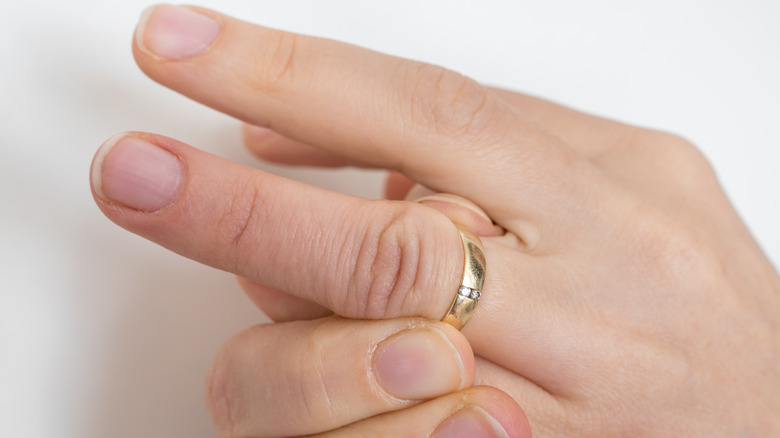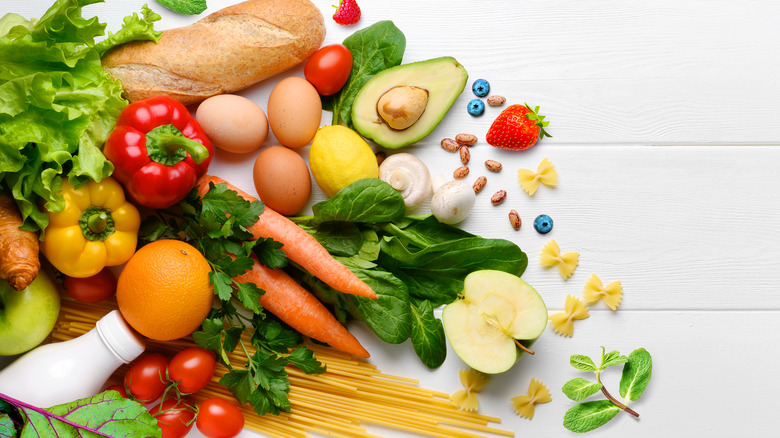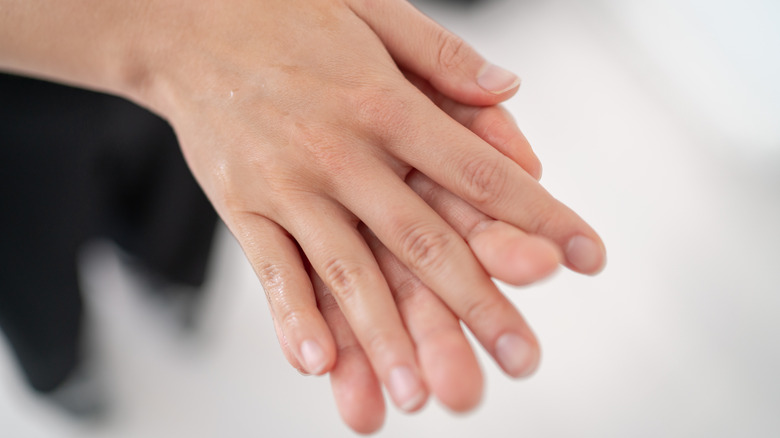Can You Lose Fat On Your Fingers?
You glimpse down at your hands and notice that your fingers are looking thicker than usual. Or maybe you reach for a ring that previously slipped right on, and now you struggle to get it over your knuckle. You suddenly feel self-conscious about your fingers, of all things! Before you hide your hands in your pockets permanently, let's look into why this happens.
Thick fingers may simply be due to deposits of excess fat (via Healthline). Everyone's body is unique in how and where it stores fat. Some people may naturally store it in their hands and fingers, and there's nothing wrong with that. If your fingers are storing extra fat and it's starting to bother you, though, you can exercise your hands — it's true. Healthline recommends picking up an instrument, like piano or guitar, or using resistance bands. In addition to toning your fingers, you may be curious to know if you can actually lose weight in your digits. Let's take a look.
When excess fat settles in your fingers
You've heard it before — you can't spot-lose weight in a specific body part. That includes your abs, your upper arms, and, yes, your fingers. The only way to try to slim down your fingers is via the tried-and-true method of slimming down your body: Take in fewer calories than you burn through proper nutrition and regular exercise. And we want to emphasize "try to" because there's no guarantee that losing weight overall will affect the girth of your fingers. It's possible for a person with a healthy weight to have thicker fingers.
A healthy diet consists of consuming fewer calorie-packed foods and refined products, increasing your intake of fiber and protein, and having smaller portions. Incorporate nutrient-dense foods, such as green leafy veggies, fiber-dense fruits, whole grains, lean meats, legumes, and healthy fats, such as those in salmon and nuts (via Healthline). Decreasing your calorie intake by 500 to 1,000 calories a day equates to losing a pound or two each week. However, your overall intake should not fall below 1,200 calories a day for women or 1,500 for men (via Harvard Health Publishing).
You might want to limit your intake of alcohol, which has loads of calories and can cause fluid retention and bloating. Along with a nutritious diet, you should exercise regularly, preferably with a workout that burns a lot of calories, such as running, swimming, or jumping rope.
Causes of temporary finger swelling
Fingers can become swollen due to fluid retention, or edema (per Mayo Clinic). When excess fluid becomes trapped in the tissues of the hands, it can appear quite prominent, making your fingers look puffy. Fluid retention can happen after eating too many salty, processed foods. Sodium intake should be less than 2,300 milligrams a day (via Livestrong). Swelling as a result of eating high-sodium foods usually resolves within a day, possibly longer if there's a lot of extra salt in your body (via Yahoo).
Finger swelling can also be caused by heat and humidity. Heat makes blood vessels expand, and as they stretch, fluid can leak into soft tissues and cause puffiness, Dr. Tammy Olsen Utset, an associate professor in the rheumatology department at the University of Chicago, told Yahoo. The swelling goes away as you move your hands.
Fingers and hands can also swell when you're jogging or walking, and then return to normal afterward. Experts don't know exactly why this happens, but according to Verywell Fit, one theory is that the centrifugal force created by the arms swinging causes fluid to pool in the fingers. Placing your hands in your pockets or elevating them for a few minutes may alleviate the puffiness.



